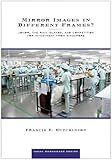Mirror Images in Different Frames? : Johor, the Riau Islands, and Competition for Investment from Singapore / Francis E. Hutchinson.
Material type: TextPublisher: Singapore : ISEAS Publishing, [2015]Copyright date: 2015Description: 1 online resource (150 p.)Content type:
TextPublisher: Singapore : ISEAS Publishing, [2015]Copyright date: 2015Description: 1 online resource (150 p.)Content type: - 9789814620451
- 9789814620468
- 338.95
- online - DeGruyter
| Item type | Current library | Call number | URL | Status | Notes | Barcode | |
|---|---|---|---|---|---|---|---|
 eBook
eBook
|
Biblioteca "Angelicum" Pont. Univ. S.Tommaso d'Aquino Nuvola online | online - DeGruyter (Browse shelf(Opens below)) | Online access | Not for loan (Accesso limitato) | Accesso per gli utenti autorizzati / Access for authorized users | (dgr)9789814620468 |
Frontmatter -- Contents -- List of Tables -- List of Figures -- Editorial Note -- Acknowledgements -- About the Author -- List of Acronyms -- 1. Introduction -- 2. Theoretical Framework -- 3. “Internal State Architecture” and Incentive Structures for Meso-Level Leaders -- 4. The Cases: Johor and the Riau Islands -- 5. Conclusion -- Endnotes -- References
restricted access online access with authorization star
http://purl.org/coar/access_right/c_16ec
In the early 1990s, Singapore, the Malaysian state of Johor, and the Riau Islands in Indonesia sought to leverage their proximity, differing factor endowments, and good logistics connections to market themselves as an integrated unit. Beyond national-level support in all three countries, the initiative had the support of state and provincial leaders in Johor and Riau, respectively. Now, however, the situation is markedly different. The Malaysian government and its Johorean equivalent have invested considerable resources in encouraging closer integration with Singapore. For its part, the Indonesian central government has been promoting special economic zones and export-oriented activities. However, the provincial government of the Riau Islands has turned away from export-oriented industrialization, preferring instead to promote cultural sub-nationalism and traditional economic activities such as fishing and small-scale farming. This development is counter-intuitive. Traditional fiscal federalism theory argues that decentralization encourages competition between provinces for investment, jobs, and growth. While Indonesia has undergone one of the world’s most far-reaching decentralization reforms, Malaysia has pursued a consistent centralization campaign at the expense of state governments. Thus, we would expect the Riau Islands’ entrepreneurial drive to be unleashed, and Johor’s to be smothered. However, Johor’s drive for capital is undiminished, while the Riau Islands’ pursuit of investment has dissipated. This monograph will explore the reasons for this paradox. “This book provides a path-breaking analysis of how Johor and the Riau Islands have competed with each other for FDI from Singapore in the electronics sector. It sheds light on how the institutional and incentive structures facing these regions have encouraged or discouraged policy innovation and dynamism. The rigorous analysis of financial and investment data in this book provides a convincing challenge to the conventional wisdom that proximity and cost differentials inevitably lead to closer economic integration.” - Professor Shujiro Urata, Waseda University
Mode of access: Internet via World Wide Web.
In English.
Description based on online resource; title from PDF title page (publisher's Web site, viewed 19. Oct 2024)


